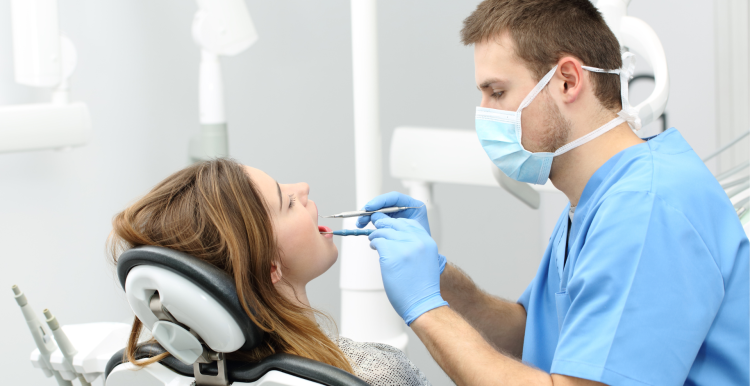Our position on NHS dentistry

Summary
Access to NHS dental care continues to be one of the main issues we hear about from the public. Difficulties getting support has led to many people living in pain. In some extreme cases, people take matters into their own hands, resorting to DIY dentistry.
Whilst some parts of England have better access, we know that people from the most deprived communities struggle the most to access dental care because they cannot afford it.
Although we welcome NHS England’s recent changes to the dental contract, we believe further reform is needed to fix the issues.
Our evidence
Lack of access to NHS dentistry has been an issue for a long time
Lack of access to NHS dentistry has been an issue raised by the Healthwatch network ever since it was formed. Initially, people in certain parts of the country – often areas of deprivation – regularly fed back concerns about the lack of available NHS dentist appointments.
The pandemic exacerbated issues – 7 in 10 found it hard to access support
During the pandemic, these problems were exacerbated. Between July and September 2020, 1,313 people from 142 council areas across England shared their experiences of NHS dentistry – compared with 238 over the previous three months. 7 in 10 people (73%) found it difficult to access help and support when needed it, compared to just over 1 in 10 (11%) who could access care easily.
People on low incomes and from minority ethnic backgrounds find it harder to afford treatment

In February 202, 2,019 adults based in England responded to an online poll that we commissioned.This identified that people in socio-economic groups D and E, and people from minority ethnic backgrounds found it harder to afford NHS dentistry, sometimes leading to them avoiding treatment.
Difficulties getting up-to-date information about practices taking on NHS patients
In December 2021, we reported on 8,019 people’s experiences of NHS dentistry between April 2020 and September 2021. Significant access problems were a key theme, including difficulties in getting up-to-date information about practices taking on new NHS patients. We heard consistent examples of people living with ongoing pain, but also extreme stories of people resorting to pulling out their teeth or using temporary fillings on a regular basis.
There is confusion about the relationship between a dental practice and patients. We heard cases where people considered that they were ‘registered’ with a dental practice but discovered that they had been ‘de-listed’ when they went to make an appointment. It is not clear to many people that being on a dentist’s ’list’ does not guarantee that they will be seen after a course of treatment has ended.
Even where appointments were available, people encountered problems. For example, we heard from several areas that families could only access NHS dentistry for their children if the parents paid for private appointments. Dental charges in general are confusing, particularly when it is not clear whether treatment – or part of it – is being delivered privately.
What we’re calling for
- A more rapid and radical reform of how dentistry is commissioned and provided – recognising that the current arrangements do not meet the needs of many people who cannot access NHS dental care in a timely way and acknowledging issues faced by the dental profession.
- Using the commissioning reform to tackle the twin crises of access and affordability – ensuring that people are not excluded from dental services because of lack of local provision or difficulty meeting charges. Currently, there are significant inequalities that must be tackled. New arrangements should be based on maximising access to NHS dental services, particularly reducing inequalities.
- Greater clarity in the information about NHS dentistry– improving information, including online, so that people have a clear picture of where and how they can access services, as well as the cost. The reform must address dentistry ‘registration’ which causes significant confusion for both services and patients.
- Look at using dental practices to support people’s general health – harnessing opportunities, like the development of Primary Care Networks, to link oral health to other key issues, such as weight management and smoking cessation.
Read about our recommendations in greater detail.
What action we’ve taken
We shared our evidence of the dentistry crisis with the Chief Dental Officer’s team at NHS England, and the Department of Health and Social Care. MPs frequently used our evidence in debates in the House of Commons and Westminster Hall to highlight the scale of the problem and the impact on individual people.
In January 2022, NHS England announced £50 million additional funding for dentistry. We’re pleased to see the Government and NHS England take action. However, more needs to be done as this is a fraction of what is required and didn’t reach all the areas in need.
On 19 July 2022, NHS England announced some changes to the dental services contract including:
- Improved payment to encourage dentists to take on more complex cases
- Flexibility about which dental professionals will be able to provide treatment, freeing up dentists’ time
- Where dentists do not deliver as many units of dental activity (UDAs) as their contact allows, the funding for unused capacity may be transferred to other dental practices that can provide additional appointments.
We will continue to monitor the feedback we receive to find out whether these changes are making any real improvement for people - particularly children as well as adults who require urgent treatment. We will continue to work with NHS England to ensure that people’s views are able to influence the future of NHS dentistry.


